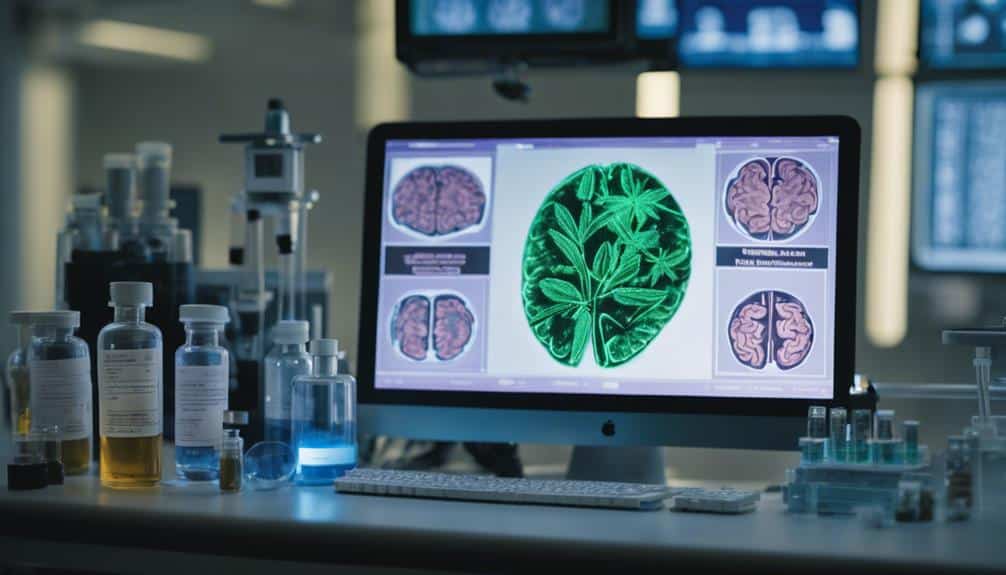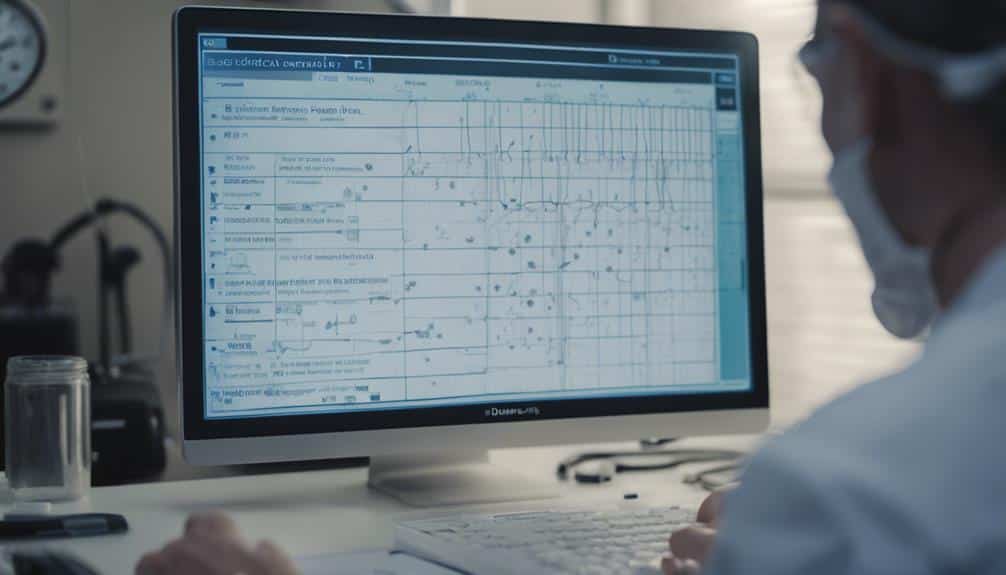Just as Prometheus brought fire to humanity, Delaware’s new studies on medical marijuana and epilepsy might illuminate the path for groundbreaking treatments. You may be curious about how these clinical trials are progressing and what this means for those suffering from epilepsy. With a focus on patient safety and data integrity, these studies are tightly regulated and could potentially reshape medical practices. Interested in the real-world impact and the stories behind the numbers? Let’s delve into how this pioneering research is addressing epilepsy symptoms and what it could mean for future medical innovations.
Table of Contents
Delaware’s Research Initiatives

Delaware’s research initiatives on medical marijuana and epilepsy focus on clinical trials that evaluate the efficacy and safety of cannabis-based treatments for seizure management. It is likely you’re aware that these initiatives require a robust regulatory framework to ensure patient safety and data integrity. Delaware has established comprehensive guidelines for clinical trials, including strict protocols for participant selection, dosage regulation, and monitoring adverse effects. These regulations aim not only to safeguard participants but also to generate reliable, reproducible data that can influence broader medical practices.
In terms of funding sources, Delaware’s initiatives are supported by a mix of state funding, federal grants, and private investments. The collaboration between public and private sectors ensures that the research is well-resourced and can proceed without financial interruptions. By securing diverse funding sources, Delaware can maintain the momentum needed for long-term studies which are critical for understanding the chronic nature of epilepsy as well as the long-term effects of cannabis-based treatments.
Your commitment to serving others will find a strong ally in Delaware’s research initiatives. They aim not only to expand scientific knowledge but also to pave the way for improved, evidence-based treatments that could greatly enhance the quality of life for individuals suffering from epilepsy.
Epilepsy Statistics in Delaware
Recent data indicates that approximately 1% of Delaware’s population is diagnosed with epilepsy, highlighting an important public health concern that necessitates targeted medical interventions. This translates to roughly 10,000 individuals within the state who are living with this chronic neurological disorder. The prevalence of epilepsy underscores the need for comprehensive healthcare strategies that address both diagnosis and management.
Demographic disparities play a vital role in epilepsy statistics within Delaware. Age, gender, and socioeconomic status greatly influence the distribution and management of epilepsy. For instance, epilepsy prevalence is higher among children and the elderly, necessitating age-specific treatment protocols.
Additionally, studies reveal that low-income communities experience a higher incidence of epilepsy likely due to limited access to healthcare resources and preventive measures. Gender disparities also exist with males showing a slightly higher prevalence of epilepsy compared to females.
Such demographic insights are essential for healthcare providers aiming to implement effective equitable treatment plans. By understanding these differences you can contribute towards reducing the burden of epilepsy through tailored interventions and resource allocation ensuring those affected receive the care they need.
Medical Marijuana Basics

Medical marijuana, increasingly recognized for its therapeutic potential, offers a promising alternative for managing epilepsy symptoms. It contains cannabinoids like THC and CBD which interact with the body’s endocannabinoid system to modulate neuronal excitability and seizure thresholds.
Understanding the legal framework is essential for practitioners and caregivers aiming to utilize medical marijuana for epilepsy treatment. In Delaware, patients must obtain a physician’s certification and register with the state’s medical marijuana program.
To help you navigate this space, here are key points to consider:
- Regulation Compliance: Ensure all activities comply with Delaware’s medical marijuana laws to avoid legal complications.
- Dispensary Locations: Familiarize yourself with state-approved dispensary locations to provide accurate guidance to patients.
- Product Selection: Different formulations and concentrations of cannabinoids are available; choosing the right product is important.
- Dosage Determination: Start with low doses and titrate slowly based on clinical response and side effects.
- Monitoring and Follow-up: Regular monitoring of seizure frequency and adverse effects is essential for optimizing treatment.
Efficacy of Treatments
Evaluating the efficacy of medical marijuana in treating epilepsy requires a thorough analysis of clinical trial data as well as patient outcomes. You need to take into account both the extent of seizure reduction as well as overall quality-of-life improvements. Recent studies indicate that medical marijuana can greatly decrease seizure frequency particularly in patients with treatment-resistant epilepsy. However, outcomes often vary due to dosage variations as well as individual patient responses.
In examining dosage variations, note that higher doses of cannabidiol (CBD) have shown more pronounced effects in reducing seizures but also necessitate careful monitoring to avoid potential adverse reactions. Lower doses might be less effective but can still provide benefits with a reduced risk of side effects. This highlights the importance of treatment personalization where you tailor the treatment regimen to the patient’s specific needs and medical history.
Clinical data from Delaware underscores the necessity of a personalized approach. Each patient’s response to medical marijuana can differ, making it essential to start with a controlled, low dosage and adjust based on observed efficacy and tolerance.
Reported Side Effects

Patients using medical marijuana for epilepsy often report a range of side effects including dizziness, fatigue, and changes in appetite. While these adverse reactions can vary in severity they’re generally manageable with appropriate dosage adjustments and monitoring. Understanding these side effects is important for optimizing treatment plans and enhancing patient safety.
Clinically, it’s important to recognize that the therapeutic window for medical marijuana can be narrow necessitating careful titration of dosages. Patients may also experience:
- Cognitive Impairment: Temporary issues with memory or concentration.
- Mood Changes: Fluctuations in mood including irritability or anxiety.
- Gastrointestinal Disturbances: Nausea or gastrointestinal discomfort.
- Dry Mouth: Persistent dry mouth or thirst.
- Coordination Issues: Problems with motor skills and balance.
For healthcare providers, monitoring these side effects is crucial to ensure the best patient outcomes. Regular follow-ups and patient education can help in making necessary dosage adjustments.
Evidence-based practices suggest starting with a low dose and gradually increasing it to minimize adverse reactions. By carefully managing these side effects, you can improve the overall efficacy of medical marijuana as a treatment for epilepsy ultimately serving your patients better.
Always consider individual patient responses and adjust treatment plans accordingly to maintain the delicate balance between efficacy and safety.
Patient Testimonials
Hearing directly from individuals using medical marijuana for epilepsy provides valuable insights into its real-world efficacy and tolerability. Patients in Delaware have shared their personal experiences highlighting the role of medical marijuana in symptom relief. Many report a reduction in seizure frequency and intensity which aligns with emerging clinical data suggesting potential therapeutic benefits.
One patient, a 34-year-old woman, described a significant decrease in nocturnal seizures after initiating medical marijuana treatment. Her personal experience underscores the importance of individualized patient care as she noted improved sleep quality as well as reduced seizure-related injuries.
Another patient, a teenager, shared that medical marijuana helped alleviate the anxiety often accompanying his epilepsy contributing to an overall enhanced quality of life.
These testimonials emphasize the necessity of patient-centered approaches in epilepsy management. The consistency in reports of symptom relief suggests a promising adjunctive role for medical marijuana.
However, it’s vital to take into account these personal experiences alongside rigorous clinical trials to establish broader applicability and safety profiles.
Healthcare Provider Insights

Healthcare providers in Delaware have observed firsthand the potential benefits and limitations of medical marijuana for epilepsy offering a critical perspective that complements patient testimonials. Your role as a healthcare provider involves understanding both the therapeutic potential and regulatory complexities of prescribing medical cannabis.
Through professional training, many of you have developed a nuanced understanding of the pharmacodynamics and pharmacokinetics involved.
Providers’ experiences reveal several key insights:
- Efficacy Variability: There’s significant variability in how patients respond to medical marijuana requiring individualized treatment plans.
- Dosage Challenges: Determining the most effective dosage can be complex necessitating ongoing adjustments based on patient response and side effects.
- Interaction Concerns: Potential drug interactions with conventional antiepileptic drugs must be carefully monitored to avoid adverse effects.
- Legal and Ethical Considerations: Maneuvering through the legal landscape involves ensuring compliance with state regulations while advocating for patient access.
- Educational Gaps: Continuous professional training is essential to stay updated on evolving research and clinical guidelines.
Your dedication to understanding these facets through professional training and real-world provider experiences enriches the clinical care landscape in Delaware. By leveraging evidence-based practices and sharing these insights, you’re better equipped to serve your patients’ needs effectively.
Patient Selection Criteria

Selecting appropriate candidates for medical marijuana treatment in epilepsy involves strict criteria to ensure patient safety and treatment efficacy. You must verify that patients meet specific eligibility requirements and qualification standards before they can access this form of therapy. The selection process is rigorous and designed to identify those who’ll benefit most while minimizing potential risks.
Eligibility requirements typically include:
- Diagnosis Confirmation: Confirm that the patient has a confirmed diagnosis of epilepsy, preferably with a detailed clinical history and diagnostic tests.
- Refractory Epilepsy: Validate that the patient hasn’t responded to standard anti-epileptic drugs (AEDs), often requiring documentation of multiple failed treatment attempts.
- Age Considerations: Some programs specify age limits, ensuring that both pediatric and adult populations are appropriately addressed.
- Comorbid Conditions: Evaluate the presence of other medical conditions that could contraindicate the use of medical marijuana.
- Medical Supervision: Ensure patients are willing to comply with ongoing medical supervision and regular follow-up appointments.
Futuristic Research Directions
To advance our understanding of medical marijuana’s role in epilepsy treatment, we need rigorous, well-designed clinical trials. We must push for studies that can provide concrete evidence on efficacy and safety.
Federal regulations currently pose significant barriers as cannabis remains a Schedule I substance. This classification makes it difficult to obtain necessary approvals for research thereby limiting the scope and depth of potential studies.
We must also address the funding challenges inherent in this field. Securing grants for research involving medical marijuana is often more intricate due to its legal status and the stigma associated with its use. Collaborating with private organizations, patient advocacy groups, and state agencies can help overcome these barriers.
Delaware’s healthcare providers should advocate for federal policy changes that facilitate easier access to research funds and resources.
Furthermore, we should focus on longitudinal studies to assess long-term effects and best dosages. Establishing a robust dataset will be essential in shaping future treatment protocols. Collaborate with interdisciplinary teams to ensure thorough analyses that consider both clinical and social dimensions.
Conclusion
Imagine you’re at the edge of a dense forest, each tree representing a step in epilepsy research. Delaware’s pioneering studies illuminate a path with medical marijuana as the guiding light. These trials backed by rigorous methodologies and stringent safety protocols offer a beacon of hope.
By charting through patient selection and monitoring adverse effects, Delaware’s research paves the way for broader medical practices. The journey is complex but the destination promises profound clinical advancements.
If you’re curious to learn more about these groundbreaking studies I invite you to visit Cannabis Docs of Delaware. Our team is eager to share insights and answer any questions you might have. Feel free to give us a call at (855) 420-6797. We’d love to hear from you and help you explore the possibilities that medical marijuana holds for epilepsy treatment.

